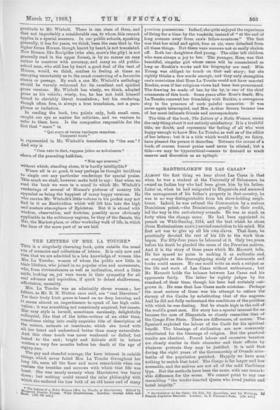THE LETTERS OF MRS. LA TOUCHE.* 'uts is a singularly
charming book, quite outside the usual run of memoirs and collections of letters. It is only now and then that we are admitted to a late knowledge of women like Nrrs. La Touohe; women of whom the public saw little in their lifetime, who joined in no popular cries and movements, 'who, from circumstances as well as inclination, stood a little aside, looking on, yet were warm in their sympathy for all teal advance and aspiration, if quick to detect shallowness, affectation, unreality. Mrs. La Touohe was an admirably clever woman ;. her aetters, as Mr. R. H. Hutton once said, are "real literature." :Yet their lively Irish grace is based on no deep learning, and it seems almost an impertinence to speak of her high culti- Nation ; it was something not consciously acquired, but innate. 3Ier easy style is herself, sometimes carelessly, delightfully ,colloquial, like that of the letter-writers of an older time, 'sometimes rising into really exquisite bits of description of the nature, animate or inanimate, which she loved with all her heart and understood better than many naturalists. -And this clear touch was never weakened or dulled, but hated to the end; bright and delicate still in letters 'written a very few months before her death at the age of 'cighty-two. ,The gay and cheerful courage, the keen interest in outside things, which never failed Mrs. La Touche throughout her long life, seem all the finer and more remarkable when one realises the troubles and sorrows with which that life was -beset. She was nearly seventy when Harristown was burnt 'down; but nothing could exceed the calm philosophy with which she endured the loss both of an old home and of many . The Lettere of a Noble Woman (Mrs. La Touche of )Iarristown). Edited by one
..;-argaret Perrier Young. With IllustrAtious. London: tioorge Allen and sh. [12s. Od. net.]
precious possessions: Indeed; she•quite enjoyed the experience of living for a time by the Yoadaide, inatead'of "at the end of long avenues away from one's, fellow-creatures." The fact was that her mind and spirit, free as air, were detached from all these things. But there were sorrows not so easily shaken off. Both her daughters died young. The elder left children who were always a joy to her. The younger, Rose, was that beautiful, singular girl whose name will be remembered as long as .Ruskit's works and his biography are read. Mies Young was obliged: to touch on that sad story; but she rightly thinks a few words enough, and they only strengthen one's conviction that Rose La Touche could not have married Ruskin, even if her religious views had been less pronounced. The drawing be made of her, by the by, is one of the chief ornaments of this book. Some years after Rose's death, NUS. La Tonche renewed her friendship with Ruskin, a courageous step in the presence of such painful memories. It was never again interrupted, and Mrs. Arthur Severn became one of her most intimate.friends and correspondents.
The title of the book, The Letters of a Noble Woman, seems the only thing about it not entirely satisfactory. It is a truthful title, no doubt, and .represents the feeling of all who were happy enough to know Mrs. La Touche, as well as of the editor of her letters; but it is a title which would hardly, we fancy, have pleased the person it describes. Between the covers of a book; of course; honest praise need • never be stinted; but a title—we May be hypercritical—seems to demand as much reserve • and discretion as an epitaph.










































 Previous page
Previous page